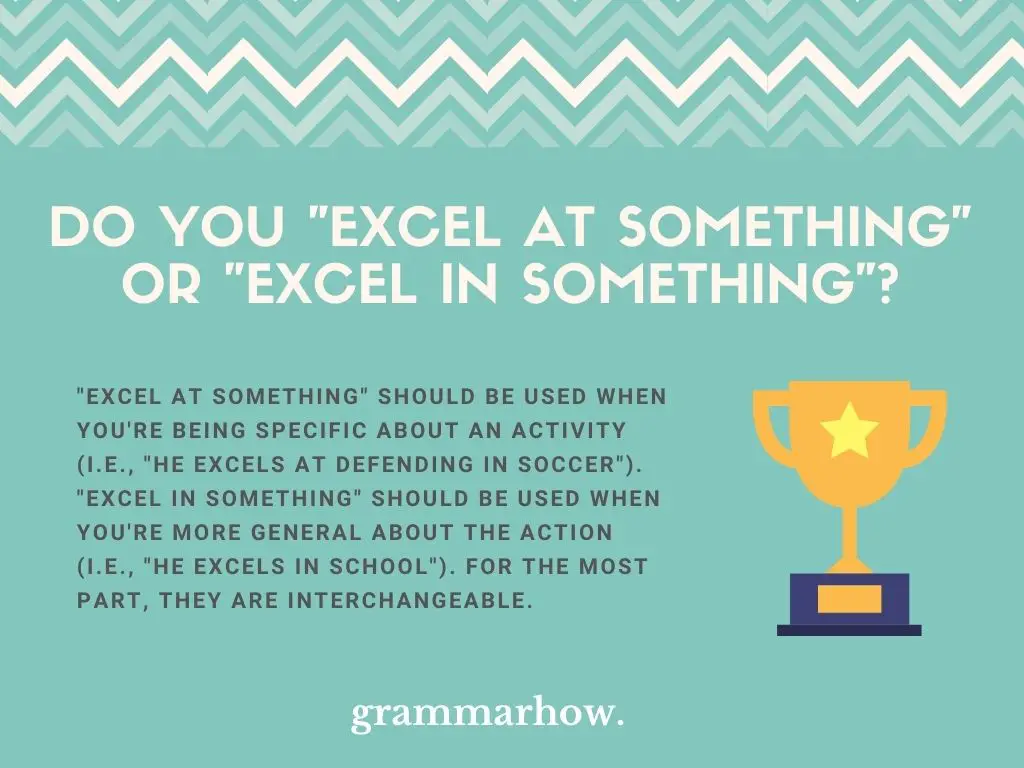Using prepositions often has quite a profound impact on certain words. They can be subtle, but there are always noticeable changes. Look at the difference between “excel at” and “excel in.” They’re similar, but there’s enough of a distinction between the two that we’ll cover now.
Do You “Excel At Something” Or “Excel In Something”?
“Excel at something” should be used when you’re being specific about an activity (i.e., “he excels at defending in soccer”). “Excel in something” should be used when you’re more general about the action (i.e., “he excels in school”). For the most part, they are interchangeable.

If you look at this graph, you’ll see how the two phrases are used compared to each other. Generally, we use “excel at something” more because it’s better to be more specific about what we’re talking about. However, it’s also the newer of the two phrases (only rising on the graph around the 1900s).

Is It “Excel” Or “Excell”?
When we want to write the word “excel,” it’s important to spell it correctly.
The correct spelling is “excel,” and “excell” is incorrect. It should not be used.
“Excell” is a common misspelling, where people think it’s a shortened version of “excellent” and keep the double L letter. However, this is incorrect, as “excel” means to be exceptionally good at an activity or subject, rather than simply meaning “excellent.”
7 Examples Of How To Use “Excel At Something” In A Sentence
Let’s look at some examples of when we use the more specific of the two variations. Seeing them in action is the most useful way for you to start using them yourself. This will help you further your own ability to understand them.
- She excels at everything she does at school.
- I excel at making sure all the chores are done at home.
- We excel at winning the league trophy every year.
- You excel at scoring the highest grades.
- He excels at making her feel uncomfortable.
- They excel at finding the best deals when they go shopping.
- I excel at knowing where to look for good donuts.
As you can see, we’re much more specific when we use this form. The “at” preposition, in this case, is used to keep things more focused on one particular activity.
7 Examples Of How To Use “Excel In Something” In A Sentence
Now let’s look at the more general use of “excel in something.” These sentences tend to be slightly shorter because we don’t need to explain the deeper specificities of activities.
- He excels in school.
- I excel in my studies.
- You excel in your homework.
- We excel in football.
- I excel in sports.
- She excels in the care industry.
- They excel in their fields.
As you can see, it’s much more general when we use “excel in something.” We’re never talking about a specific happening, rather just a job or activity instead.
Excel At/In Something – Synonyms
Now let’s look at some synonyms that we can use if you don’t want to confuse the two prepositions. This will help you convey the same meaning without worrying about making little language mistakes that people may want to correct.
- Shine at/in
This is a more casual phrase, but it works well when you want to talk about someone shining at something.
- Stand out at/in
This is also a great replacement for “excel” and means that someone is exceptionally talented or gifted at something.
Is It “Exelled”, “Exceled”, Or “Excelled”?
If you want to use the past tense, you might be slightly confused, but you don’t have to be.
“Excelled” is the correct past tense form. We usually include “-ed” at the end of a past tense word. However, if that word already ends in “l”, we add another “l” to help out.
Which Other Prepositions Can Be Used After “Excel”?
Finally, let’s look at some other prepositions we can put after excel and what they may mean.
- He excelled on his course. (on)
We use this mostly when someone has taken part in something and done well with it.
- You excelled through me! (through)
We use “through” when we want to take credit for someone else excelling at something.
- You excelled for us! (for)
We use “for” when we want to show that someone excelled because they wanted to impress a group of people.

Martin holds a Master’s degree in Finance and International Business. He has six years of experience in professional communication with clients, executives, and colleagues. Furthermore, he has teaching experience from Aarhus University. Martin has been featured as an expert in communication and teaching on Forbes and Shopify. Read more about Martin here.

